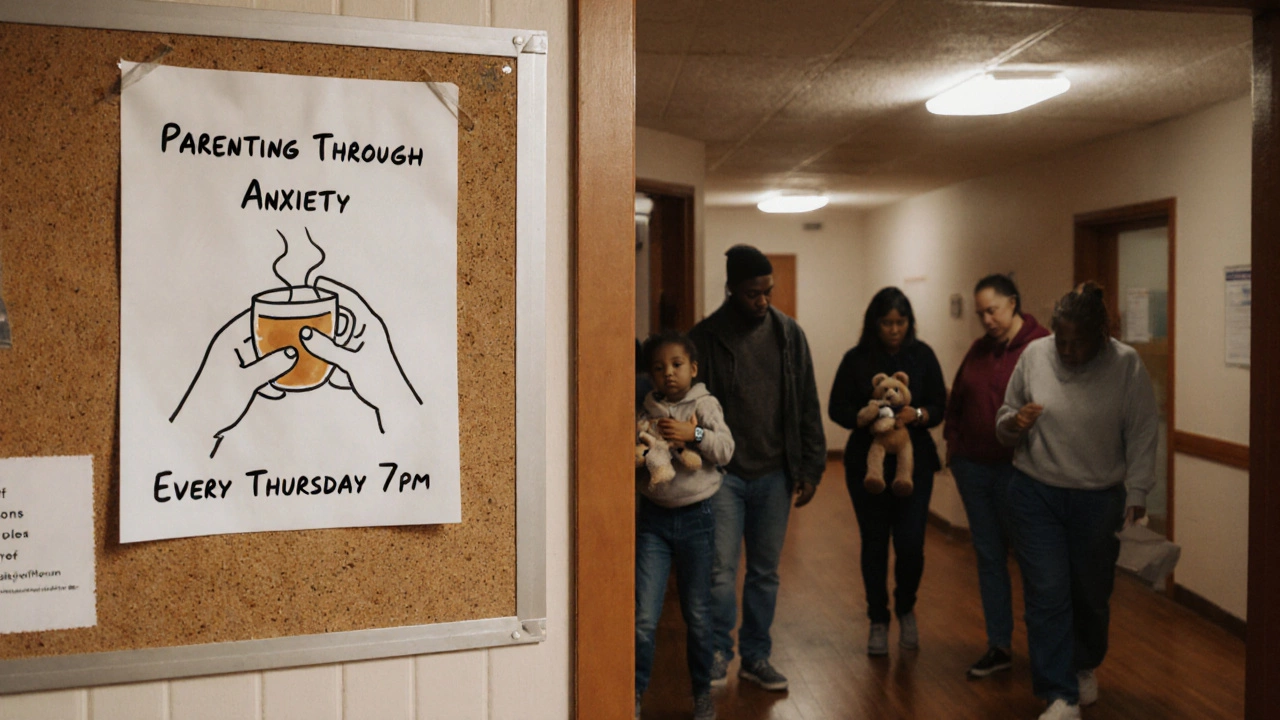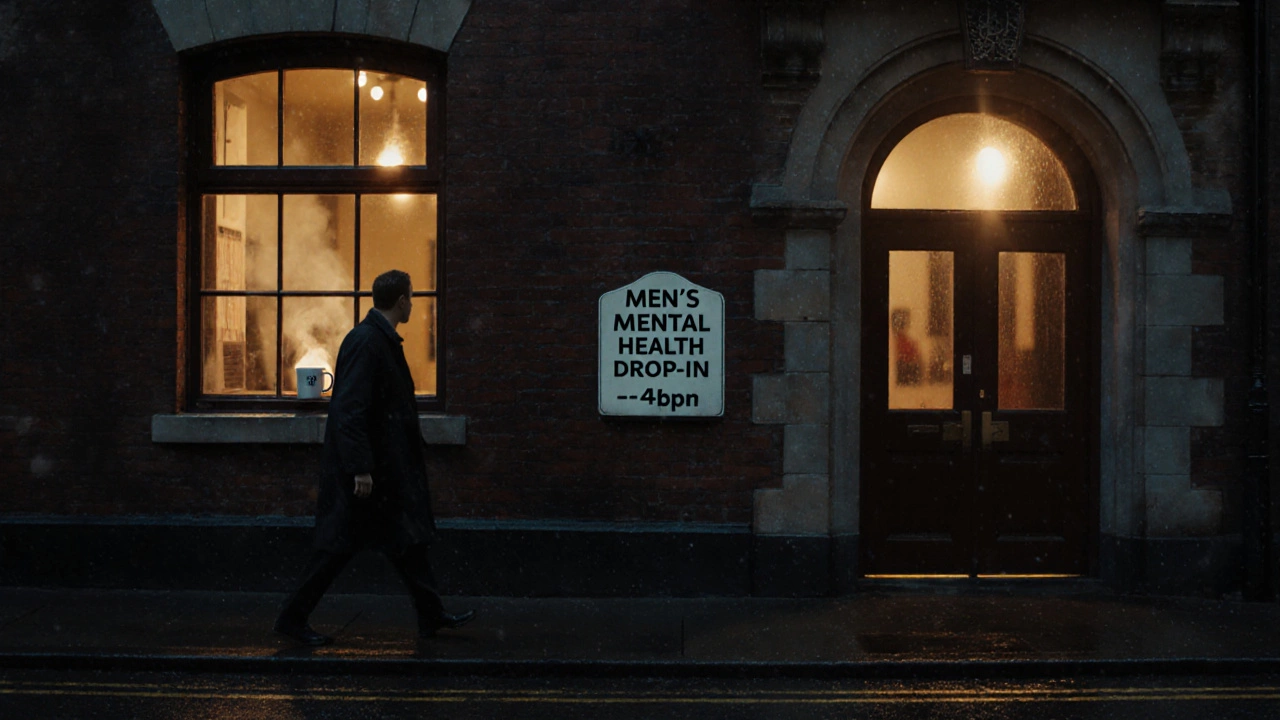Support Group Quality Checker
Check your support group
Assess if a group meets the key criteria for being a safe, helpful peer-led space using guidelines from local community resources.
Key criteria to check
Answer based on what you know about the group before attending
Group Evaluation
Based on community guidelines from Bristol's local resources like NHS Choices and Volunteer Bristol
Feeling alone in a crowd is more common than you think. Whether you’re dealing with grief, a new diagnosis, parenting struggles, or just need people who get it-finding a real support network isn’t about scrolling through social media. It’s about showing up in person, in your own neighborhood, where people are already doing the work.
Start with what’s already in your town
Most support groups don’t advertise on billboards. They meet in church basements, library meeting rooms, community centers, and even coffee shops. In Bristol, you’ll find weekly gatherings for people recovering from addiction, caregivers of loved ones with dementia, new parents, and those navigating chronic illness. These aren’t big organizations with websites. They’re run by people who’ve been there. Start by calling your local library. Ask the librarian: "Do you know of any support groups meeting here this month?" Librarians often keep a list on a clipboard behind the desk. They know who’s renting the room on Tuesday nights. They know which group moved from the community center to the church hall last spring. Same goes for your local health center. Ask the receptionist or a nurse. They don’t just hand out prescriptions-they know who’s running the postpartum group, the anxiety circle, or the LGBTQ+ youth drop-in. These are the people on the ground. They’re not paid to give out lists, but they will if you ask kindly.Use free, trusted platforms-not just Google
Google might give you ads for paid therapy apps or distant national organizations. But you want local. Try these instead:- NHS Choices-search for "support groups near me" on the NHS website. It lists free, NHS-vetted groups across England.
- Volunteer Bristol-they maintain a directory of local peer-led groups, many not listed anywhere else.
- Meetup.com-filter by "health and wellness" and your postcode. Look for groups with at least 10 regular members and recent activity.
- Local Facebook groups-search "Bristol [your issue] support". Avoid groups with 5000 members and zero posts. Look for smaller ones with real stories and regular meetups.
What to look for in a good group
Not every group is right for you. Some feel cold. Others are too emotional. Here’s what separates a helpful group from a wasted hour:- Clear structure-Do they start and end on time? Is there a facilitator who keeps things respectful?
- No pressure to share-You can sit and listen for three meetings. That’s normal.
- Focus on peer support-The group should be run by people who’ve lived the experience, not therapists selling services.
- Safe space rules-No interrupting, no advice unless asked, no judging.
- Consistency-If the group meets every Tuesday at 6:30 for six months straight, that’s a sign it’s sustainable.

Try three before you decide
It’s okay to try a group and leave after five minutes. That’s not failure. That’s data. Go to one group this week. Go to another next week. Then a third. Notice how you feel walking in. Do people make eye contact? Do they say "welcome"? Is there tea? Is the room warm? These small things matter more than the group’s name. One woman in Bristol joined a grief group after her husband died. She went three times. The first, she cried the whole time. The second, she barely spoke. The third, she brought a photo. Someone else said, "That’s my daughter’s dog too." That’s how real connections start-not in a formal introduction, but in a quiet moment over a mug of tea.What if you can’t find one?
Sometimes, the group you need doesn’t exist yet. That’s okay. You don’t need permission to start one. Pick a topic: "Parents of teens with anxiety," "People recovering from stroke," "Single dads in South Bristol." Then:- Find a free space: library, church hall, community center. Call them. Ask if they have a room you can use once a week.
- Post a simple flyer: "Looking for others who [your issue]. We meet every Thursday at 7pm at [place]. No pressure. Just talk. Tea provided."
- Put it up in the library, the pharmacy, the grocery store, the bus stop.
- Post on Facebook: "Bristol [topic] group-first meeting this Thursday. Come if you’re tired of feeling alone."

Keep going, even when it’s hard
The hardest part isn’t finding the group. It’s showing up when you’re exhausted. When you don’t feel like talking. When you think no one will understand. But here’s what happens when you keep going: Someone says something that sounds exactly like your inner voice. Someone else nods because they’ve thought the same thing. You realize you’re not the only one who stares at the ceiling at 3 a.m. wondering if they’re doing it right. Support networks aren’t magic. They don’t erase pain. But they turn isolation into companionship. And that changes everything.Where to look next in Bristol
Here are a few real, active groups in Bristol right now (as of November 2025):- Bristol Grief Support-Every Tuesday, 6-7:30pm, St. Mary’s Church Hall, Stokes Croft. Free. No registration.
- Parenting Through Anxiety-Every Thursday, 7-8:30pm, Horfield Community Centre. For parents of teens. Led by two local moms.
- Neurodivergent Adults Bristol-First Saturday of the month, 11am-1pm, Cabot Circus Library. Coffee and quiet space. No pressure to speak.
- Postnatal Peer Support-Every Wednesday, 10am-12pm, Totterdown Community Centre. Run by a midwife and two doulas.
- Men’s Mental Health Drop-In-Every Friday, 4-6pm, The Old Fire Station, Easton. Free tea, no questions asked.
What if I’m shy and don’t know what to say?
You don’t have to say anything. Many people sit quietly for their first few visits. Just being there counts. If someone asks how you are, you can say, "I’m just listening today," and that’s enough. No one will push you. Support groups aren’t interviews-they’re spaces where silence is respected.
Are support groups free?
Yes, the vast majority of local support groups in Bristol are completely free. Some may ask for a voluntary donation for tea and biscuits, but no one will turn you away if you can’t pay. If someone asks for money upfront, walk away. Legitimate peer-led groups don’t charge fees.
Can I bring a friend or family member?
It depends on the group. Some are for the person directly affected only. Others welcome a support person. Always ask first. Groups focused on personal recovery-like addiction or trauma-usually ask you come alone so the space stays safe and focused. Parenting or caregiver groups often welcome partners.
What if I go and no one talks?
It happens. Sometimes the group is quiet because everyone is tired, or it’s a new group, or the topic was heavy. Don’t assume it’s a bad group. Try again next time. Or ask the facilitator: "Is this usually quiet?" Most will tell you it’s normal. Some groups are more talkative than others. That doesn’t mean one is better.
How long should I keep going before I know it’s working?
You won’t feel "fixed." But you might notice small shifts: you stop checking your phone during meetings, you start looking forward to tea, you say "hi" to someone before they say it to you. These are signs you’re building connection. Give it at least three meetings. If you still feel worse after that, try a different group. It’s not you-it’s the fit.
If you’re not ready to join a group yet, start small. Walk into a community center and ask for a calendar of events. Sit in a library and read a local newspaper. Say hello to someone at the coffee shop. Connection begins with a single step. You don’t need to have it all figured out. You just need to show up.
